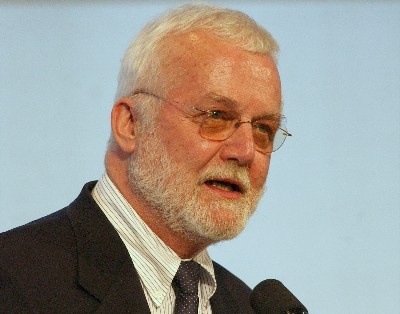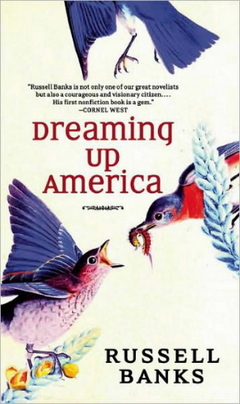Short Fuse: Russell Banks’ American Dream
By Harvey Blume
“Dreaming up America”
By Russell Banks
Seven Stories Press,
176 pages, $21.95
This book of essays by novelist and short story writer Russell Banks was published before our country’s financial crisis reached the acute stage from which it may or may not be recovering, or the author would surely have voiced bracing opinions and commentaries veering toward prophecy in accord with the tonality of this slim volume, which grows ever darker and more dire as it proceeds.

In this volume of essays as in his fiction, Russell Banks comes off a bit
like the Yahweh of the Hebrew Bible, trigger happy when it comes to judgment.
“Dreaming up America” began as a series of talks the writer was asked to give on French television with the aim of correcting impressions of American history conveyed by Hollywood. Banks, it should be said, knows Hollywood first hand: his novel, “Affliction”, filmed in 1998, earned Nick Nolte, its star, an Oscar nomination for Best Actor. His 2004 book, “The Darling” is currently being filmed by Martin Scorcese with Cate Blanchette in the lead.
As for Banks’s qualifications to discuss American history, readers of novels like his “Cloudsplitter” and “The Darling” can have no doubts about the deft and rewarding historical sense he brings to his fictions. It’s not surprising then, that before discussing film in the new book, Banks has already laid out a compelling overview of the forces — the “three braided strands” as he calls them — that have defined America since being loosed on the New World by Spanish, Dutch, French, and English conquerors and settlers.
These strands consist, to start with, of the “religious dream of the City on the Hill,” the hope that here, in the New World, shielded from the influences of “corrupted old Europe,” it would be possible to live out “a holy life under the eye of God.” The second dream is that of El Dorado, the City of Gold, the “material dream” that conceives of America as a vast reservoir of wealth just waiting to be
exploited. Last, there is the dream of America as the Fountain Of Youth, springboard for new beginning, rebirth, starting over. “The three dreams merge,” Banks writes, becoming “more powerful than any one of them alone.”
The War of Independence is a key stopping point for him as he brings his argument forward. He stresses that the American victory was the unexpected culmination of a protracted struggle, the significance of which has been unfortunately overshadowed, in our memory, by the calamitous suffering of the Civil War. For Banks, it’s important to reinstate the War of Independence as no mere revolt but a true revolution, articulating for “all to see,” he writes, “the most radical concept of democracy then on the planet: the idea of representative government. . . governance by and for the governed.” The Declaration of Independence and the Constitution that flow from American victory are, to his mind, “extraordinary acts of creative genius.”
Those revolutionary founding documents serve, for Banks, as counterweights to what he soon calls the “visual siren song” of Hollywood, which “has occasionally been subversive, but more often serves the pleasure of the powers that be.” In a sense, Banks is a stringent proponent of the second of the Bible’s Ten Commandments, opposing texts to images. The commandments make the case that text – the then hot new medium of alphabetic text — is the only fit medium for truth. Imagery — graven, or as in Banks’s argument, celluloid — is built for nothing but illusion.
Banks is so creative a thinker and writer that even as he depicts America souring from foundational text toward siren song cinema, he can’t but spin off insights. But there’s a problem in his account, much the same problem that chokes his fiction. Banks is never content just to animate an array of characters that only he could breath life into; he seems equally if not more determined to subject them to withering judgment. Banks, in regard to his fictions, is a bit like the Yahweh of the Hebrew Bible, trigger happy when it comes to judgment, ready — tempted, from the beginning perhaps — to an obliterating dissolution of the fruits of a momentous creation.
The last pages of “Dreaming up America” are laced with contempt for an America that has thickened into empire. The judgments are not necessarily wrong, but they can, as in his fictions, be suffocating. By the end of the book, the other dreams have melted away, and Americans are left only with the dream of the City of Gold.
This brings me back to my initial question: what would Banks say as that last dream too appears to be on the verge of bursting, in the rebound from Wall St. to Main St., like a mere bubble? That Russell Banks’s view would almost certainly be harsh does not in the least suggest that it is wrong.


